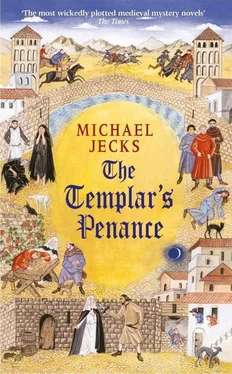Michael Jecks - The Templar
Здесь есть возможность читать онлайн «Michael Jecks - The Templar» весь текст электронной книги совершенно бесплатно (целиком полную версию без сокращений). В некоторых случаях можно слушать аудио, скачать через торрент в формате fb2 и присутствует краткое содержание. Год выпуска: 2014, ISBN: 2014, Издательство: Headline, Жанр: Исторический детектив, на английском языке. Описание произведения, (предисловие) а так же отзывы посетителей доступны на портале библиотеки ЛибКат.
- Название:The Templar
- Автор:
- Издательство:Headline
- Жанр:
- Год:2014
- ISBN:9781472219763
- Рейтинг книги:4 / 5. Голосов: 1
-
Избранное:Добавить в избранное
- Отзывы:
-
Ваша оценка:
- 80
- 1
- 2
- 3
- 4
- 5
The Templar: краткое содержание, описание и аннотация
Предлагаем к чтению аннотацию, описание, краткое содержание или предисловие (зависит от того, что написал сам автор книги «The Templar»). Если вы не нашли необходимую информацию о книге — напишите в комментариях, мы постараемся отыскать её.
The Templar — читать онлайн бесплатно полную книгу (весь текст) целиком
Ниже представлен текст книги, разбитый по страницам. Система сохранения места последней прочитанной страницы, позволяет с удобством читать онлайн бесплатно книгу «The Templar», без необходимости каждый раз заново искать на чём Вы остановились. Поставьте закладку, и сможете в любой момент перейти на страницу, на которой закончили чтение.
Интервал:
Закладка:
‘What of the beggarwoman? Did she recognise him?’
‘I haven’t spoken to her yet. I was seeking her when your messenger told me you wanted to talk. I was very busy. My apologies. I didn’t intend to be rude, but I think my response might have seemed so.’
Baldwin gave a flick of the hand as though discarding any possible upset. ‘You had much to deal with.’
‘What was it you wanted to tell me?’
Simon saw that Baldwin wasn’t quite recovered from his shock on hearing of Matthew’s death, so he began to tell Munio of their conversation with Dona Stefania and Don Ruy.
‘So there are two other men from Don Ruy’s band of pilgrims with whom we should speak,’ Munio summarised. ‘This peasant who ravished the Prioress, and the priestly man, Frey Ramon, wherever he might be.’
‘There is a third man, of course,’ Simon pointed out. ‘The felon. We know Don Ruy saw him. Perhaps he had something to do with all this! It is too much of a coincidence that he should take back the horse and then be seen leaving the city. He made sure Joana went to pay the blackmailer, and then followed her.’
‘Yes,’ Baldwin said, trying to set his mind to the problem again. It was hard. All he could see was the careworn face of Matthew as he had seen him yesterday. It was only one day ago, and that made it so much more difficult to believe that the man was truly dead. There was an emptiness in his soul. It had been fine to learn that his old friend was alive, to see a comrade from the days of his youth, and now that last friend was dead. ‘I shall find him,’ he growled.
‘Who?’ Simon asked, but then he looked at Baldwin’s face and understood.
‘Munio, could I see Matthew’s body? I wish to say farewell to an old friend.’
Chapter Fifteen
Dona Stefania got up from her kneeling posture and made her way out of the chapel. This was her third visit here today, and she would spend as much time here as she could over the next days. She had to make sure that her decision was right.
It had been hard, deciding to steal the thing, but better that than seeing the priory collapse. That was her overriding concern, the survival of the priory. It was not a task made any easier by her nuns. Usually, a Prioress should be able to hope for the assistance of her Sisters, but in the convent of Vigo there were too many arguments as her nuns vied for power. It was frustrating, but there was little peace in her home. That was part of the reason why she had acquired this thing.
There was a tingling in her breast at the thought. She had borrowed the relic from Orthez to help her convent and it had worked, bringing in many people from about the lands. Vigo was some way south of Compostela, and had always suffered from a lack of pilgrims, but with rumours of the relic’s miracles carefully disseminated by Dona Stefania, suddenly folk made the short journey from Compostela down to her convent. People who had never heard of the place before had suddenly started flocking there.
When the demand came for the relic to be returned, she hadn’t believed it at first. However, the request was confirmed by the Bishop of Compostela, and it was impossible to ignore. When she had asked to borrow the sacred relic, she had said she would want it for some years, and the church at Orthez had apparently had no objection. But now, after seeing how much profit Dona Stefania had made from the relic, they had apparently changed their minds. One of the priests had passed by her convent, and when he saw how many travellers were stopping there, he obviously took back highly favourable reports about the success of her venture. After that, it took but a few days for the church authorities, especially that pathetic old cretin Sebastian, to decide to demand the return of their relic, Saint Peter’s finger bone.
They should have been more polite. As it was, they were rude and discourteous, and that got her goat immediately. She swore that she wouldn’t return the thing to them, no matter what they demanded. In fact, she screwed up the parchment and hurled it into the fire. Damn them and their legalistic rubbish! They had forgotten that Dona Stefania was the daughter of a lord, once wife to an important knight, or they wouldn’t have dared write in so curt a manner.
She had been white-faced with fury, almost incoherent with rage when Joana had found her. Joana, the angel, had come in with a tray when Dona Stefania had just consigned it to the flames, and soothed her with that calmness and calculation which were so much a part of her.
‘They demand the return of their relic? Then you must return it.’
‘I shall not! The thing was promised to us for years. Just because they can see that we’re better suited to attracting pilgrims, that doesn’t mean that they should have it back! It’s why the thing should stay with us in Vigo. It’s worth a fortune to us here.’
‘It is said that the Saint himself can decide where his relics stay,’ Joana said thoughtfully as she poured wine and passed the goblet to Dona Stefania. ‘Perhaps the Saint would prefer to remain here with us, in the quieter atmosphere of the convent. That might be why he has favoured us with so many pilgrims when he did not treat Orthez with such generosity.’
Dona Stefania felt her mouth drop open. Of course there were many stories of churches and cathedrals stealing each others’ relics, and then claiming that they possessed them by right of the Saint’s own wishes — for if the Saint did not wish to be there, he or she could miraculously move him- or herself to another location — but it hadn’t occurred to Dona Stefania to use that argument. Now, though, as Joana crossed the floor and placed the jug on the cupboard, she considered the idea and began to see its merits.
‘They’ll soon beg for the Bishop to return it if we refuse.’
‘Oh, I think the best thing would be to go to Orthez and give them back their relic in their box,’ Joana said, ‘but then come back to Compostela and ask the Bishop what he would advise.’
‘That’s no good! If I deliver it to them, we’ll never get it back.’
Joana ignored her scathing tones. ‘They won’t have it back. You will give them the box, but with another small bone in it. We shall keep the original bone here, in our own little casket. We can have one made specially for it. Then, when you come home from Orthez, you can stop at the Bishop’s palace and ask him for his support. All you need do is point out that the Saint has made his will clear by showing you how to deceive the men of Orthez. Surely no Bishop would go against the plain will of the Saint himself? And then you can come back here to our little convent, and arrange a feast in honour of the Saint who has so honoured our little chapel.’
The scheme was breathtaking in its simple beauty — and in its purity of revenge against Orthez — but Dona Stefania felt a certain irritation that the suggestion had come from her maid and not from herself.
There were plenty of precedents for such action, after all. There were stories of an English church which had lent a relic to a French one, but who then had demanded its return. The French sent back a relic, but later, when they were trying to tempt back more pilgrims, they let it be known that in fact they had sent back an imitation and had kept the original. The pilgrims dried up in the English church and began to drift towards the French church again, but then the whole story grew more confusing when the English declared that they had never sent the genuine relic in the first place. Knowing that their French brothers were unreliable in sending back loaned relics, the English had sent a copy themselves. The French had stolen a fake.
This could have been true. Certainly Dona Stefania knew perfectly well that the French and English clergy were about as unfriendly as their secular lords; all were at daggers drawn over the English territories like Aquitaine, which the French King had confiscated only thirty years before. Since then there had been continual disputes in the English lands. French churches also vied with each other for possession of relics. Vezelay had the relics of Saint Marie Madeleine, but Aix-en-Provence claimed that these had been stolen from them.
Читать дальшеИнтервал:
Закладка:
Похожие книги на «The Templar»
Представляем Вашему вниманию похожие книги на «The Templar» списком для выбора. Мы отобрали схожую по названию и смыслу литературу в надежде предоставить читателям больше вариантов отыскать новые, интересные, ещё непрочитанные произведения.
Обсуждение, отзывы о книге «The Templar» и просто собственные мнения читателей. Оставьте ваши комментарии, напишите, что Вы думаете о произведении, его смысле или главных героях. Укажите что конкретно понравилось, а что нет, и почему Вы так считаете.












